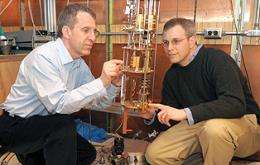New Amplifier Pushes the Boundary of Quantum Physics

(PhysOrg.com) -- If powerful new quantum computers are to reach their enormous potential, they will need amplifiers capable of transmitting signals so weak they consist of a single photon. In the May 6 edition of the journal Nature, a team of Yale scientists report creating an amplifier almost as efficient as the laws of quantum physics allow.
Quantum computers, like cell phones, depend upon sophisticated microwave amplifiers to ensure that information is accurately retrieved. However, all amplifiers contain inherent flaws - most notably flaws which produce random noise that can obscure the signal. In quantum mechanics, the Heisenberg uncertainty principle dictates that a small amount of noise is inevitable, no matter how good the amplifier.
“If you want take information out of the computer, you will have to amplify very weak signals,” said Michel Devoret, Frederick William Beinecke Professor of Physics and Applied Physics at Yale’s School of Engineering & Applied Science and senior author of the paper. “The aim of our research is to devise an amplifier for signals so tiny they have only one photon in them.”
“Michel and his team have developed a new design for a practical amplifier using superconducting electrical circuits at cryogenic temperatures that comes very close to the ideal limit of this minimum amount of added noise,” said Steven M. Girvin, deputy provost for science and technology, the Eugene Higgins Professor of Physics & Applied Physics at Yale’s School of Engineering & Applied Science and a co-author of the work.
The Yale effort to build a quantum computer based on superconducting electrical circuits relies on incredibly weak microwave signals to both control and measure the quantum state of the computer. The typical signal power that must be measured is on the order of one billionth of one billionth of a watt, equivalent to the power of a cell phone call signal received on the moon from someone on earth.
Other Yale authors on the paper are: Nicola Bergeal, Flavius Schackert, Michael Metcalfe, R. Vijay, Vladimir Manucharyan, Luigi Frunzio, Daniel Prober, and Robert Schoelkopf.
Researchers at the University of Maryland and the University California, Berkeley also contributed to the paper.
More information: Phase-preserving amplification near the quantum limit with a Josephson ring modulator, Nature, 465, 64-68 (06 May 2010) doi:10.1038/nature09035
Provided by Yale University

















